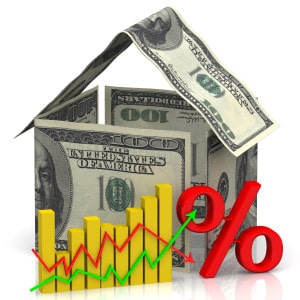
A house made of American dollar bills standing on white surface with red symbol of percentage and the diagram. Isolated. 3D Illustration
As single-family home values continue to soar across the commonwealth, homeowners are quickly building equity and borrowing against it. New companies have sprung up in the last year or so that for the first time offer homeowners the ability to sell a portion of the equity in their homes to raise cash.
Two years ago, 31,502 single-family homeowners in Massachusetts took out home equity loans or lines of credit, according to data from The Warren Group, publisher of Banker & Tradesman. That number jumped 24 percent to 38,925 in 2016. As of the end of October 2017, 34,384 homeowners had borrowed against the equity in their homes.
But not everyone can, or wants, to borrow against their home equity. People at or near retirement age often don’t qualify.
Help For Homeowners
Companies like Patch Homes, Point and Project HomeTap, a local startup poised to launch in 2018, were created to make money for investors by helping homeowners liquidate a portion of the equity in their homes. Unison, which came to the Boston market about a year ago, is one of those companies.
Unison will give qualifying owners a check for up to 20 percent of the market value of their home, which is repaid when the home is sold. At the sale of the property, the owner repays the original investment plus 35 percent of the property’s price appreciation after a minimum of three years. If the property loses value in the interim, Unison absorbs 35 percent of the loss, according to Michael Micheletti, Unison’s director of corporate communications.
“There are a lot of different tools available to owners looking to unlock the equity in their homes,” Micheletti said. “Most of the people who use us really value the fact that they don’t have monthly payments. They’re trying to clear debt. They don’t want to swap one payment for another payment.”
There are no restrictions on how homeowners use the money, he said, and they can also buy out Unison after a period of three years.
“The program works well for folks on a fixed income,” he said. “They can’t get a HELOC, but they have all this money locked up in their house. They can make some repairs or upgrades in the home, maybe help grandkids with college tuition.”
Help For Homebuyers
Unison also has a homebuyer program, giving qualifying buyers a portion of their down payment to be repaid when the home is sold, plus a percentage of the appreciation, typically 35 percent.
In competitive markets where buyers are competing with all-cash offers, Micheletti said some clients use Unison’s program to boost their down payments above 20 percent. And cash-strapped prospective homebuyers aren’t the only ones who like the program.
“Realtors love it because with the added buying power, they can show people more homes. Buyers put more money down, so they don’t have to pay mortgage insurance and they get a better interest rate,” he said. “And loan originators can qualify more people.”
Buyers are typically referred to the program by lenders who work with Unison. Currently, Unison is working only with Guaranteed Rate in Boston, but Micheletti said the company is close to adding two more Boston-area lenders in the next month.
Another Tool For Financial Planners
Jim Cote, a financial advisor with Concord Wealth Management, said he hadn’t heard of this kind of program before, but found the concept interesting. He said it reminded him of the TV show Shark Tank, where small company owners hope to make deals with investors by offering a share of ownership in exchange for a share of future profits.
“I can imagine it being a good plan for older people who don’t have income, but do have a lot of equity in their home,” Cote said. “Or someone who is given a house but they don’t have a lot of income. They could use the money to fix up the house and eventually sell it.”
Unison requires participants in their homebuyer plan stay in the house a minimum of three years, in part to discourage house flippers from participating in the program.
“This is not for investors who are trying to flip homes,” Micheletti said. “They have to live in the house. It’s about increasing homeownership; it’s not about giving investors more tools. They have plenty of tools. Consumers need help buying a home and servicing all the other debt. We want them to succeed: when they win, we win.”




 |
| 
